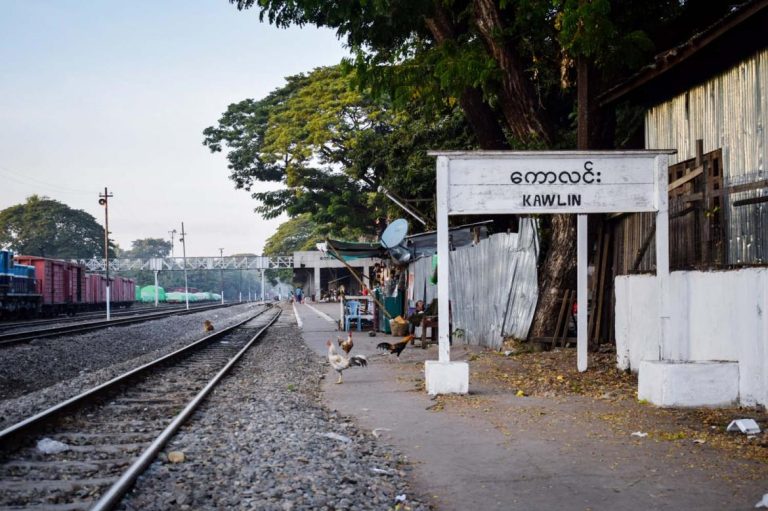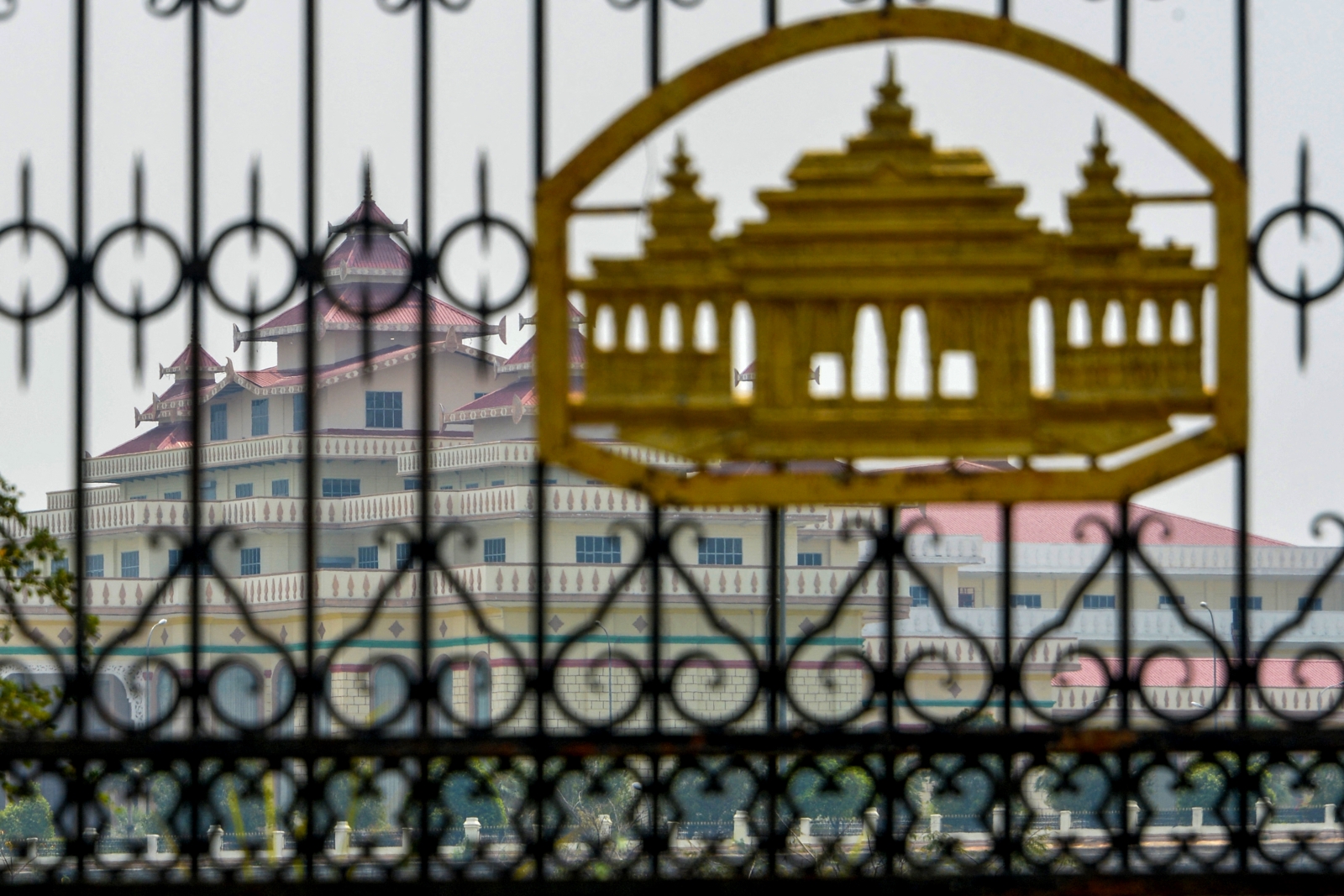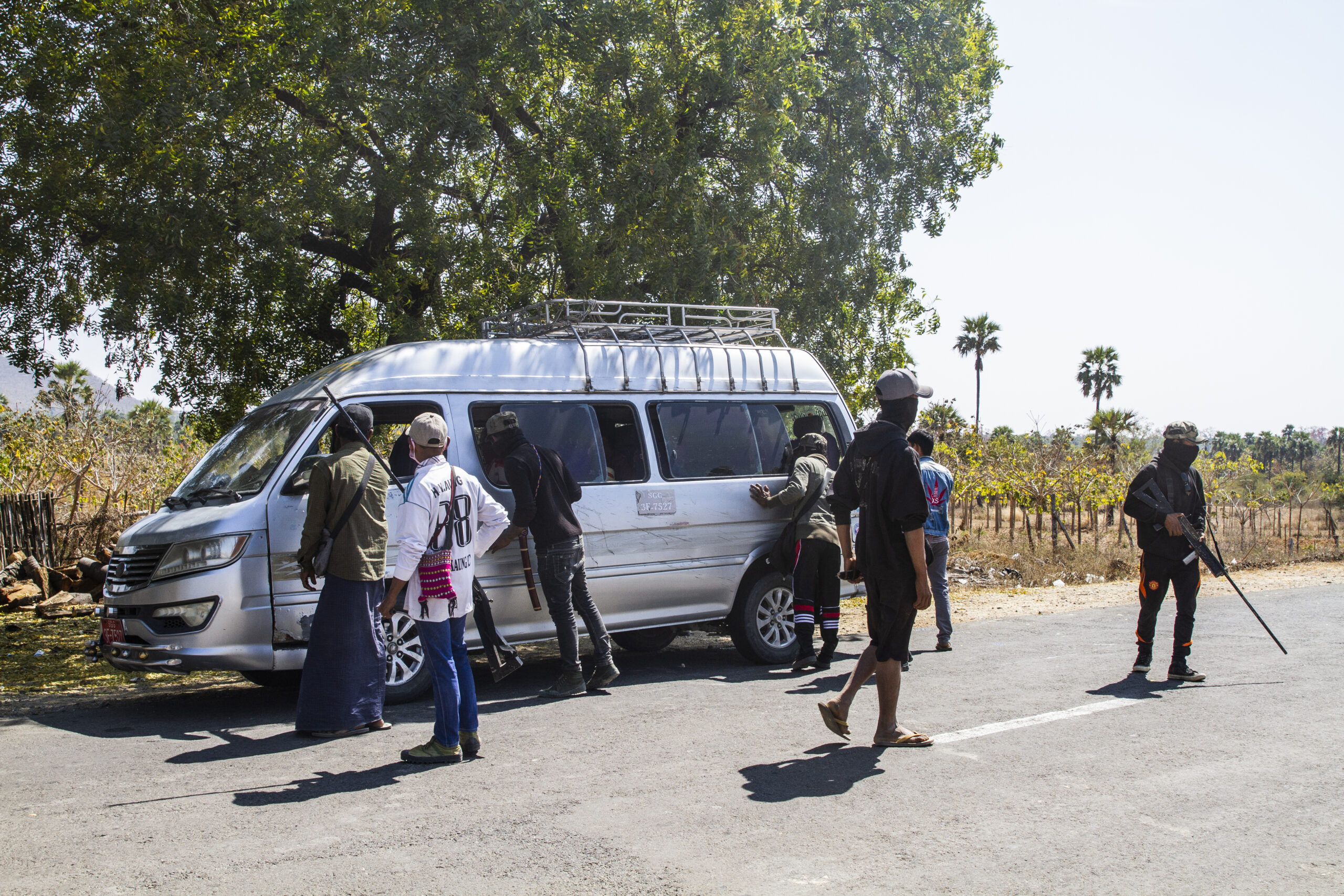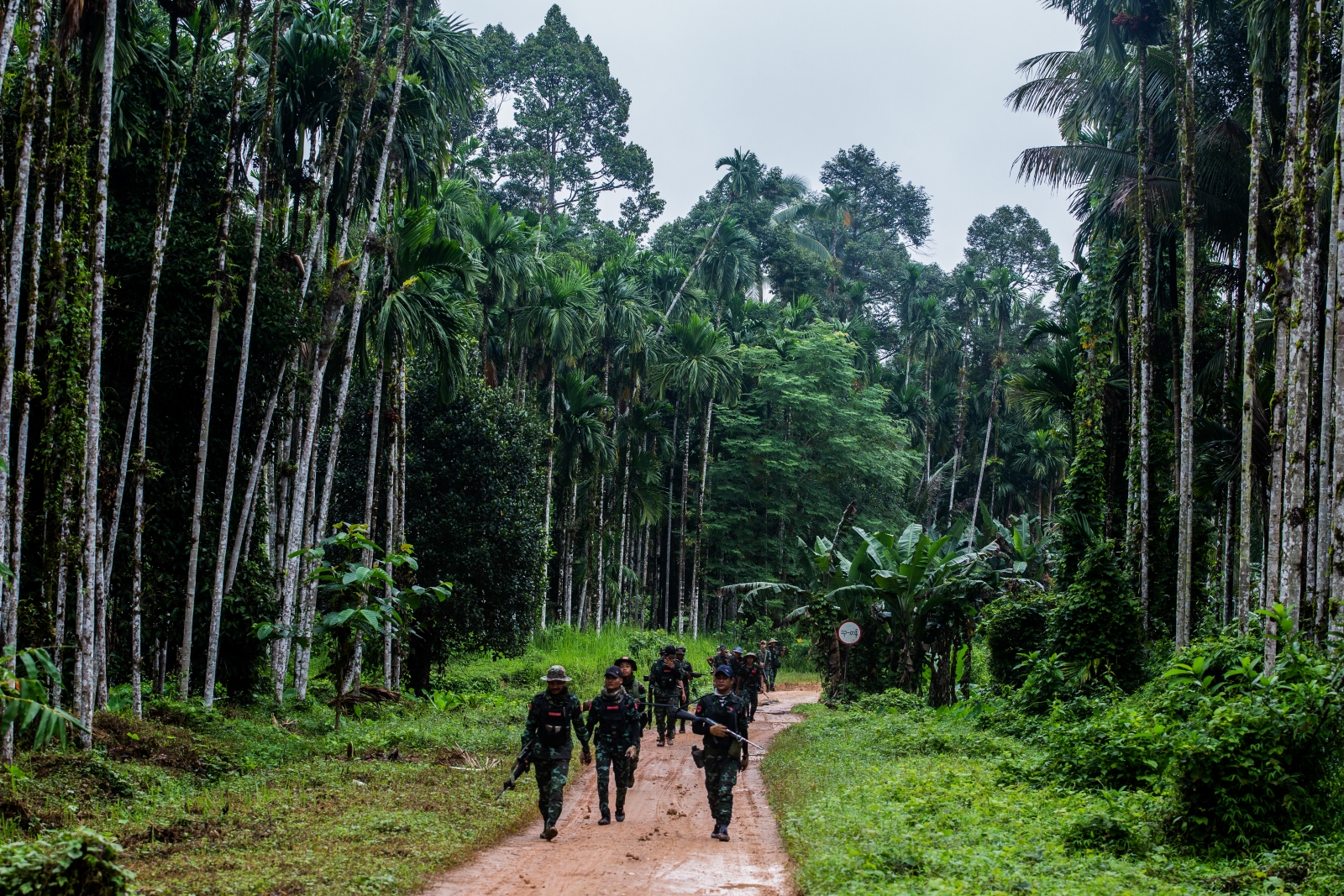Communities in Sagaing Region are speaking out against the proliferation of gambling dens run by armed resistance groups, but feel they have little recourse in the face of intimidation and an ineffective chain of command.
By HKUN SETT | FRONTIER
On a chilly February evening in war-torn Kani Township, a peculiar scene unfolds in a small, dimly lit room. Ten men huddle together in a circle, sitting on a mat among ashtrays, cans of energy drinks, liquor bottles, cards and piles of cash. They’re playing a popular Myanmar card game called Shan Koe Mee, a variation of Blackjack.
One of them is wearing a military uniform, adorned with a homemade muffler and the distinctive red badge of the Kachin Independence Army.
Local defence force member Ko Kyaw Myint* claimed the KIA officer was sent to oversee military affairs in cooperation with the National Unity Government, a parallel administration appointed by elected lawmakers deposed in the coup, and the other gamblers include battalion commanders of resistance groups under NUG command.
Following the 2021 military coup and violent crackdown on peaceful protests, pro-democracy armed groups were formed to overthrow the new regime. Many of them have collaborated with more established ethnic armed groups like the KIA, which has been fighting for autonomy for the Kachin people for decades.
Although some of these groups, known as People’s Defence Forces and People’s Defence Teams, are under the nominal authority of the NUG, they typically enjoy broad autonomy on the ground. LDFs, like Kyaw Myint’s group, remain totally independent, while still ostensibly dedicated to the same goal.
However, tensions have been growing between these forces, particularly in Sagaing, leading to several armed clashes. Some PDFs have accused LDFs of acting unprofessionally, such as by extorting civilians or refusing to comply with a code of conduct published by the NUG.
Some LDFs, meanwhile, have accused their NUG-affiliated counterparts of engaging in illegal activity like timber logging or bullying smaller groups.
The emergence of gambling dens in PDF areas is an additional source of tension. Interviews by Frontier indicate that gambling dens run by NUG-affiliated armed groups have sprung up in resistance strongholds across Sagaing, including in Kani, Khin-U, Ye-U, Taze, Yinmabin and Tabayin townships.
The proliferation of these establishments has upset some local residents, yet fear of reprisal stifles any attempts to address the issue.
“We’re powerless against them. They have guns and weapons,” said Ko Aung Soe*, a farmer from Aung Mingalar village in Kani. “No one dares to speak out.”
Raising the stakes
Gambling for money has long been prohibited in Myanmar and offenders are punished by up to five years in prison. The 2019 Gambling Law permits gambling under certain circumstances, but an accompanying licensing system was never introduced, leaving the industry in a regulatory void.
Despite this, gambling establishments can be found throughout Myanmar, with owners typically maintaining close ties to criminal syndicates and bribing law enforcement officials to avoid punishment. Frontier has reported a dramatic increase in these venues in junta-controlled areas since the coup, due to growing corruption, lawlessness and poverty.
As conflict rages across Sagaing, resistance groups have gained influence over many rural areas, where the junta’s administration has been dismantled. But locals say gains by resistance groups in some areas have corresponded with a surge in gambling dens.
Aung Soe said before the coup, there were only one or two gambling dens per village, but now there are as many as five to 10. Locals claim many of these gambling dens are operated by PDTs, highly localised armed units under the NUG’s defence ministry.
“They establish these dens and actively participate in the gambling businesses,” Kyaw Myint alleged.
In Khin-U Township, LDF logistics officer Ko Thar Htet said PDTs have established cockfighting rings and card gambling dens in Mu Thar and That Pay villages, and actively take part in both.
“They go around the villages betting on card games and cockfighting. They do it for two days in each village, taking turns,” he claimed. “In the good old days before the coup, they wouldn’t dare do this. However, during the revolution, as power fell into their hands, they began operating gambling dens on a large scale.”

The house always wins
As is always the case in gambling, while some punters win big, others lose everything, and only the house is guaranteed to profit.
Ko Aung Maung*, who used to gamble in the PDT dens in rural Khin-U, said he’s seen people lose hundreds of thousands of kyat over time. “A small number of people win, but most people lose. The PDT makes a lot of money every day, sometimes up to K10-20 million [around US$4,760-9,520],” he claimed.
Aung Soe said some gamblers who have lost big have had to sell their homes or farms to recuperate their losses.
Illegal gambling can also lead to other societal ills, like a rise in theft or drug use. Residents say that this hasn’t become a serious problem in Sagaing yet, partly due to the PDFs strict regulations, but it’s something they remain concerned about.
“These things are not good in the long term,” said Aung Maung. “I fear that crime will rise. I’m really worried about it.”
Kyaw Myint and Thar Htet accused the resistance groups of using the gambling rings for their own financial benefit and entertainment.
“Instead of using public donations to buy weapons, they use them for gambling,” Thar Htet alleged.
But Ko Myo Aung, information officer for the NUG-affiliated People’s Administration Team in Khin-U’s Lat Pan Hla village, denied this, claiming the gambling dens are likely a source of funds to support the war against the regime. PATs are civilian administration bodies, but in practice often have significant overlap with armed resistance groups.
“The cost of weapons and ammunition is high, and the people are also struggling financially. The flow of donations has decreased. Some defence forces have to improvise their own way to survive,” Myo Aung said.
But Thar Htet said this doesn’t explain how the PDTs got the money to set up the gambling dens in the first place.
“Where does this money come from? It’s not something they can do with their own money. The stakes involved are very high,” he said.
Myo Aung said the PAT is trying to crack down on illegal gambling.
“We don’t allow drugs or gambling in our township. They’re forbidden. We once broke up a gambling den in the north,” he said, claiming the township-level people’s administration issued a notice banning the practice.
However, Thar Htet said many village-level PDT groups simply ignored this ban.
“Their chain of command is feeble, and the leaders seem ignorant of the actual situation,” he said.
Myo Aung acknowledged the administration struggles to control subordinates.
“Some groups have disobeyed the commands of the township-level administration. We are trying to build unity among different groups, but sometimes it is difficult to control,” he said.
Folding in the face of intimidation
While most locals seem to oppose the proliferation of illegal gambling, they feel powerless to stop it. Ko Aye Lwin* in rural Khin-U told Frontier that another resident of his village publicly criticised the PDT and was then falsely accused by its members of being a dalan, or military informant.
“One of the villagers criticised them, saying that these actions were wrong. They went to this person’s house and asked whether he was dalan or if he supported the junta. The following day, the person no longer felt safe living there and was compelled to relocate to the town,” said Aye Lwin, who was a teacher before joining a mass strike of public servants to protest the coup.
Since the coup, alleged military informants have been assassinated by resistance forces on a near-daily basis, without due process.
“If we speak out, we will be killed,” said Aung Soe, the farmer from Kani.
Thar Htet said the actions of resistance forces are undermining their public image within the communities they are supposed to protect.
“It’s not good to see them sitting around with weapons and playing card games for money. That’s not the way a revolutionary should act,” he said.
Myo Aung, from the PAT, promised action would be taken against those who break the law.
“The people are our comrades. If we are fighting against dictators, we should not behave like dictators ourselves… no one is above the law,” he said, adding that first efforts will be made to reach a peaceful understanding with the groups involved in gambling.
“If that doesn’t work, the relevant organisations will intervene and take action. Those who disobey will be arrested.”
Despite Myo Aung’s promises, there’s little indication the NUG sees this as a serious issue or is trying to rein it in. Kyaw Myint said his LDF in Kani wrote a letter to the NUG, appealing for intervention, but never received a reply.
Repeated attempts by Frontier to contact the NUG’s defence ministry were also unsuccessful.
“It’s breaking the spirit of the revolution,” said Thar Htet. “We are working tirelessly in the hot sun while they waste the money we donated in shady gambling dens.”
Hkun Sett is the pen name of a freelance writer in Myanmar.
* indicates the use of a pseudonym for security reasons







